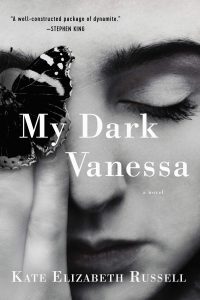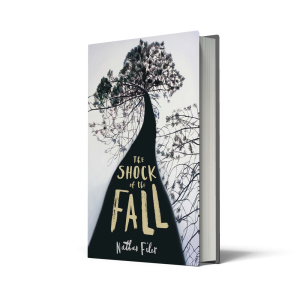I’ve just finished reading a deservedly hyped novel: My Dark Vanessa by Kate Elizabeth Russell.

It’s a contemporary response to Lolita, Nabokov’s masterpiece about a painfully self-deluded paedophile who falls in love with (at a warped stretch of the definition) and repeatedly rapes a child. Lolita is told from the perspective of a male predator; My Dark Vanessa is told by a female victim. Vanessa Wyes is just fifteen when she first has sex with her forty-two year old teacher, the beginning of what she perceives to be a tragic love affair. It’s only in adulthood, when during the #MeToo movement this teacher is accused by other ex-students of sexual abuse, that Vanessa is forced to reappraise what took place between them.
It’s a work about the complexity of trauma and the internalisation of abuse. So that’s the story. Then there’s the story behind the story. During a massive pre-publication marketing campaign, Russell faced a barrage of criticism, essentially denouncing her as the wrong person to have written her novel. The essayist, Wendy C Ortiz (whose true-life account of abuse at the hands of a teacher had formed part of Russell’s extensive research) led the charge. She expressed her anger and distress that a ‘fictionalised’ and ‘sensationalised’ story with such clear parallels to her own was receiving so much attention. Personally, I didn’t perceive sensationalism in the narrative of My Dark Vanessa but it is, indisputably, fiction. And it makes complete sense to me that a person who has lived through such a horrendous experience mightn’t wish to engage with – and indeed, might feel injured by – fictional accounts.
But then another twist in the tale: In response to the mounting criticism against her, Russell disclosed that she herself had experienced similar events as a teenager, and that these were in fact the real inspiration behind the book. It seems to me horrendous that she may have felt pressed into such a disclosure. In a statement on her website, she laments that anyone should ‘compel victims to share details of their personal trauma with the public’. Her publisher, she explains, had tried to protect her boundaries by including a reminder to readers that the novel is fiction.
So here is a question: If Russell did not have lived experience of abuse, would she really be unqualified to try and imagine the life of someone who had?
It’s not an especially original question. It’s representative of a heated debate that the publishing industry is currently wrestling with, to wit: who has the right to write what? The controversy surrounding My Dark Vanessa is far from an isolated example. The recent international bestseller American Dirt by Jeanine Cummins became embroiled in a cultural appropriation scandal when it was roundly criticised for its inaccurate portrayal of Mexico and Mexicans. In the case of both of these novels, the more thoughtful criticisms go beyond condemning the individual authors and seek to hold publishing to account: why is the industry prepared to pay massive advances to predominantly white, often middle class authors who may have no personal experience of their subject, while authors from marginalised backgrounds consistently struggle to find a platform for their more authentic works.

This brings me to my own first novel, The Shock of the Fall. It didn’t arrive on the shelves with quite the same fanfare as American Dirt or My Dark Vanessa, but it still garnered attention and reached a wide readership. It’s a story about a young man named Matthew Homes who is grieving the death of his brother, and who suffers from the kind of psychological breakdown that is commonly labelled ‘schizophrenia’. It was inspired by the feelings I was left with after working as a mental health nurse, as well as many of my personal childhood experiences. So, like all novels, it drew upon both truth and imagination. I have never received a diagnosis of schizophrenia myself, and neither, mercifully, have I succumbed to the distressing thoughts, feelings and behaviours that might put me on that path.
Another question, then: did I have the right to write that book?
Since its publication, I’ve received hundreds of messages from readers, including many who have been diagnosed with schizophrenia, and the loved ones and carers of people who have. I feel assured that – on the whole – my novel has been received as a force for good. Matthew’s story has offered comfort and reassurance, and readers have recognised their own experiences within it.
That’s not to say there aren’t dissenting voices. I have also been accused of inauthenticity and inaccuracy, and some have speculated that I voyeuristically used my encounters with vulnerable people as source material. It’s not my intention to respond to those criticisms here. Doubtless readers of Asylum Magazine will hold their own views. A broader point I’d like to make, though, is that for me the creative act of imagining the life of Mathew Homes felt akin to an extended and deeply meditative exercise in empathy. This is something that I believe writing a novel (and reading one) and mental healthcare have in common. To do them well requires bucketloads of empathy; of striving to understand and share the feelings of others. I cannot regret undertaking that exercise, though I also acknowledge that working on our empathy does not necessarily serve the interests of those we might empathise with. It doesn’t solve anybody’s problems. It is, at best, a beginning.
There are more questions to ask: As publishers belatedly consider the risks and merits of white authors depicting black and minority ethnic protagonists, are novels with ‘mad’ protagonists to be viewed in the same light? When I suggested to my wife that perhaps I shouldn’t have written The Shock of the Fall because I do not have a diagnosed mental illness, she raised a telling eyebrow: You’re not exactly sane, though, are you? Does the ever shifting continuum that we call our state of mind – the psychological fragility of everyone – make mental health fiction a uniquely special case? Most of us have at least glimpsed the edges of madness at certain dark moments in our lives. And if you haven’t when you start writing your novel, I bet you will have done by the time you finish it. Flannery O’Connor said it best: “Writing a novel is a terrible experience, during which the hair often falls out and the teeth decay. I’m always irritated by people who imply that writing fiction is an escape from reality. It is a plunge into reality and it’s very shocking to the system.”
Those of us who take an interest in mental healthcare will be familiar with the argument that disproportionately high numbers of black, male patients are not well served by disproportionately high numbers of white, female psychologists. A similar problem is true of publishing, where it’s impossible to move for all the posh, white people. Little wonder if literature feels skewed. Black Lives Matter and #MeToo have given every institution pause for thought, not least the literary agencies, publishers and prize committees that serve as gatekeepers to our reading material.
We are, hopefully, living through a moment of tectonic cultural change. However, when the dust settles, and we take in the new landscape, one thing will doubtless remain the same: people will still be making shit up and writing it down; combining memory, imagination and experience in infinitely varied ratios. Fiction is at the heart of human culture. Now is a perfect moment to ask what we need from it, and from our storytellers.
